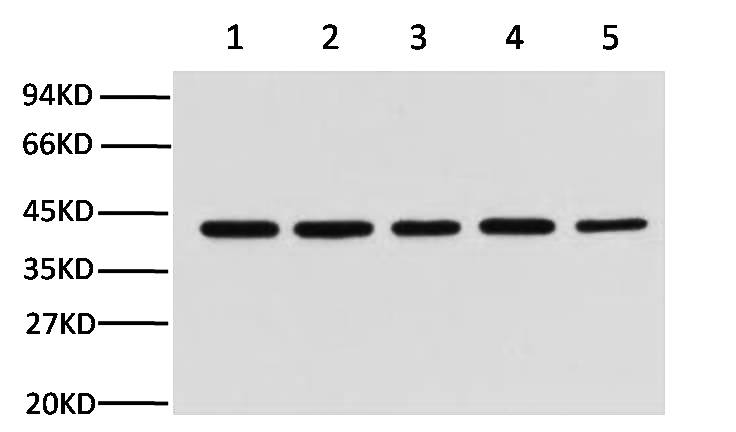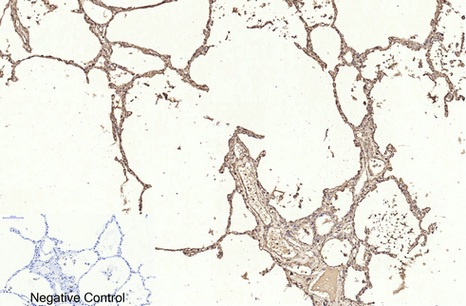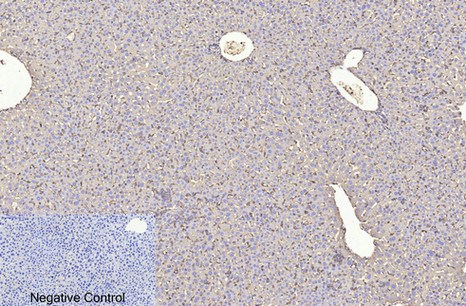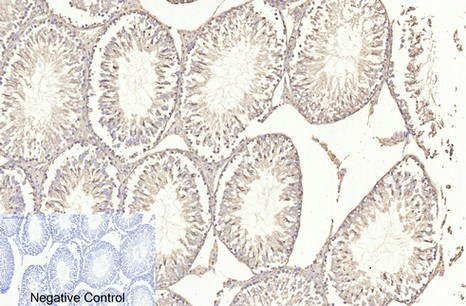| Product name | Anti-β-Actin Mouse Monoclonal Antibody (1C7) |
| Immunogen | Synthetic Peptide |
| Host | Mouse |
| Reactivity | Chicken, Dog, Hamster, Human, Insect, Monkey, Mouse, Rabbit, Rat |
| Applications | IF, IHC-P, WB |
| Applications notes | Optimal working dilutions should be determined experimentally by the investigator. Suggested starting dilutions are as follows: WB (1:10000), IHC-P (1:400), IF (1:100-1:400). |
| Clonality | Monoclonal |
| Preparation method | The antibody was affinity-purified from mouse ascites by affinity-chromatography using specific immunogen |
| Alternative | ACTB; Actin; cytoplasmic 1; Beta-actin |
| Formulation | Liquid solution |
| Concentration | 1 mg/ml |
| Storage buffer | Liquid in PBS, pH 7.4, containing 0.02% Sodium Azide as preservative and 50% Glycerol. |
| Storage instructions | Stable for one year at -20°C from date of shipment. For maximum recovery of product, centrifuge the original vial after thawing and prior to removing the cap. Aliquot to avoid repeated freezing and thawing. |
| Shipping | Gel pack with blue ice. |
| Precautions | The product listed herein is for research use only and is not intended for use in human or clinical diagnosis. Suggested applications of our products are not recommendations to use our products in violation of any patent or as a license. We cannot be responsible for patent infringements or other violations that may occur with the use of this product. |
| Background | β-Actin (gene name ACTB), a ubiquitous eukaryotic protein, is the major component of the cytoskeleton. At least six isoforms are known in mammals. Actins are highly conserved proteins that are involved in cell motility, structure and integrity. β-actin is a major constituent of the contractile apparatus, which is usually used as a loading control, for among others, the integrity of cells, protein degradation, in PCR and Western blotting. Its molecular weight is approximately 43 kDa. |
| Gene ID | 60 |
| Alternative | ACTB; Actin; cytoplasmic 1; Beta-actin |
| Accession | P60709 |
| Observed Band(KD) | 43 |

Fig.1. Western blot analysis of hela (1), rat brain (2), Mouse brain (3), chicken lung (4) and rabbit testis (5), diluted at 1:10000.

Fig.2. Immunohistochemical analysis of paraffin-embedded human lung tissue. 1, β-actin Monoclonal Antibody (1C7) was diluted at 1:400 (4°C, overnight). Negative control was used by secondary antibody only.

Fig.3. Immunohistochemical analysis of paraffin-embedded Mouse liver tissue. 1, β-actin Monoclonal Antibody (1C7) was diluted at 1:400 (4°C, overnight). Negative control was used by secondary antibody only.

Fig.4. Immunohistochemical analysis of paraffin-embedded rat testis tissue. 1, β-actin Monoclonal Antibody (1C7) was diluted at 1:400 (4°C, overnight). Negative control was used by secondary antibody only.
Author:Luo, Yufeng, et al. Publication name:Cell Discovery IF:33.5
Author:Jiang H Y, Yang Y, Zhang Y Y, et al Publication name:Redox Biology, 2018, 14: 361-370. IF:8.37
Author:Z Li, M Yan, Z Wang, Y An, X Wei, T Li Publication name:Thrombosis and Haemostasis IF:6.7
Author:Zheng, Zhaoyue, et al. Publication name:Frontiers in Pharmacology IF:5.6
Author:Erhui Jiang, Zhi Xu, Meng Wang, et al Publication name:FASEB J. 2019 Apr;33(4):5690-5703. IF:5.595
Author:Xiao dong Zhang, Yan Li, et al Publication name:Journal of Experimental & Clinical Cancer Research. 2018; 37(1): 216. IF:5.34
Author:Huanxian Chang, TingtingDi, YaWang, et al Publication name:Neurobiol Dis. 2019 Mar 22;127:350-361. IF:5.227
Author:Yajing Fang, Weiwei Cao, Fuqiang Liang, et al Publication name:Food Chem. 2019 Sep 1;291:101-109. IF:5.19
Author:Weidong Ma, Ziyuan Wang, Yan Zhao Publication name:Oxid Med Cell Longev IF:5.076
Author: Li Y, Hao D, Wei D Publication name:Molecules IF:4.927
Author:He Y, Liu R, Yang M, Bi W, Zhou L, Zhang S, Jin J, Liang X, Zhang P Publication name:Front Oncol IF:4.848
Author:Xue Wu, Jing‐hua Meng, Feng‐ling Xu, et al Publication name:J Cell Mol Med. 2019 May 26. IF:4.41
Author:Fang Z, He Q W, Li Q, et al Publication name:The FASEB Journal, 2016, 30(6): 2097-2107. IF:4.32
Author:Zhou YF, Li YN, Jin HJ, et al Publication name:FASEB J, 2018, 32(4): 2181-2196. IF:4.32
Author:X Yang, YW Lu, X Zhao, S Xu, L Lin Publication name:Frontiers in Microbiology, 2019. IF:4.3
Author:J Guo, X Ye, Y Zhao, D Huang, Q Wu, A Ihsan Publication name:Food and Chemical Toxicology IF:4.3
Author:Dong, Chaoran, et al Publication name:Scientific Reports 6(2016): 36860. IF:4.29
Author:Zhang L, Song J, Bai T, et al Publication name:Sci Rep, 2017, 10; 7(1): 4950. IF:4.29
Author:Zhao Y, Wang Q, Yan S Publication name:Front Pharmacol IF:4.225
Author:Ji’an Bi, Yong Yang, Binghua Chen, et al Publication name:Front Microbiol. 2019 Mar 20;10:568. IF:4.19
Author:Xiong Y, Cao S, Xiao H, Wu Q, Yi H, Jiang Z, Wang L, Publication name:J Anim Sci Biotechnol IF:4.167
Author:Xiong Y, Cao S, Xiao H, Wu Q, Yi H, Jiang Z, Wang L, Publication name:J Anim Sci Biotechnol IF:4.167
Author:Lin Zhu, Guangjie Wu, Xiaoyan Yang, et al Publication name:Sci Rep. 2019 Feb 28;9(1):3020. IF:4.122
Author:Xin Fu, Zihang Shi, Yun Jiang, et al Publication name:BMC Plant Biol. 2019 Jun 3;19(1):233. IF:4.03
Author:Guo Y, Yue Q, Gao J, et al Publication name:J Virol, 2017, 91(20). IF:4.02
Author:Z Ma, Y Fan, Y Peng, L Bian, J Zhou, L Wang Publication name:Bioscience Reports IF:4
Author:X Wu, M Ding, Y Liu, X Xia, BJ Wang Publication name:Front. Mol. Neurosci., 31 January 2019. IF:3.97
Author:Xue Wu, Mei Ding, Yi Liu, et al Publication name:Front Mol Neurosci. 2019 Jan 31;12:13. IF:3.902
Author:Kaushik P, Ali M, Salman M, Tabassum H, Parvez S, Publication name:Neurochem Int IF:3.881
Author:Shi F, Yang Y, Kouadir M, et al Publication name:Oncotarget, 2016. IF:3.86
Author:Liu Q Q, Liu H, He Z G, et al Publication name:Oncotarget, 2017, 8(32): 53465–53481. IF:3.86
Author:Chen, Jiaxi, et al. Publication name:Toxicology and Applied Pharmacology IF:3.8
Author:Life Sci Publication name:M Ali, H Tabassum, MM Alam IF:3.647
Author:Fatima Z, Guo P, Huang D, et al Publication name:Toxicology, 2018, 19, 400-401: 28-39. IF:3.49
Author:Zheng T, Wang Q, Bian F, Zhao Y, Ma W, Zhang Y, Lu W, Lei P, Zhang L, Hao X, Chen L, Publication name:Toxicol Appl Pharmacol IF:3.347
Author:GuoZhu, HuananWang, et al Publication name:International Immunopharmacology. 2017; 50: 1-5. IF:3.32
Author:Hu, Jianqiang, et al Publication name:Biochim Biophys Acta (2016). IF:3.18
Author:Dev Comp Immunol Publication name: 2019 Mar;92:77-86. IF:3.09
Author:Q Li, X Li, B Wu, Y Niu, R Ma, J Xie, A Ali, R Feng Publication name:Virus Research IF:2.934
Author:Chun Wang · Jie Luo · Zhihang Chen Publication name:Digestive Diseases and Sciences IF:2.751
Author:H Peng, L Jin, Q Zhang, Y Shen, Publication name:Traditional Chinese Medicine and Small Molecule Treatment of Tumors IF:2.65
Author:Ai Lu, Cyrollah Disoma,YuzhengZhou, et al Publication name:Biochemical and Biophysical Research Communications, 13 April 2019 IF:2.62
Author:Jiang S, Jiang L, Yang J, et al Publication name:Gene, 2018, 10; 639: 44-51. IF:2.60
Author:Xiu-Ying He, Liu-Lin Xiong, Qing-Jie Xia, et al Publication name:Biomed Res Int. 2019 Feb 20;2019:6821219. IF:2.55
Author:Qingbiao Xu, Hongyun Liu, Fengqi Zhao, et al Publication name: J Sci Food Agric. 2019 Jan 15;99(1):100-108. IF:2.49
Author:H Lin, Y Hong, B Huang, X Liu, J Zheng Publication name:BioMed Research International, Volume 2019. IF:2.41
Author:XY He, LL Xiong, QJ Xia, YY Wang, XM Zhao Publication name:BioMed Research International, Volume 2019. IF:2.41
Author:Shengyue Ji, Ming Liu, et al Publication name:Biomed Research International. 2018; 2018:7809512. IF:2.41
Author:E Jin, Y Pei, T Liu, et al Publication name:Food and Agricultural Immunology. 2019, 30(1): 743-761. IF:2.07
Author:Liu Y, Fu Q Z, Pu L, et al Publication name:Mol Med Rep, 2017, 16(4): 5107-5112. IF:1.97
Author:Ben-Xiang Qi, Ying-Jian Chen, et al Publication name:Cytotechnology. 2017; 69(5): 775-783. IF:1.90
Author:Zheng X, Chen L, Du X, et al Publication name:Exp Ther Med, 2017, 13(6): 2855-2861. IF:1.50
Author:H Chen, N Ali, W Lv, Y Shen, Z Qing, Y Lin, B Chen Publication name:Sugar Tech, 2019. IF:1.27
Author:Lu T, Luo H, Liu J, et al Publication name:Int J Clin Exp Pathol, 2017, 10(2): 2351-2362 IF:0.205
Author:Yajing Fang, Mengmeng Xia, Fuqiang Liang, et al Publication name:J Agric Food Chem. 2019 Feb 27;67(8):2350-2360. IF:/
You must be logged in to post a review.
Reviews
There are no reviews yet.